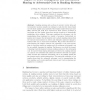Free Online Productivity Tools
i2Speak
i2Symbol
i2OCR
iTex2Img
iWeb2Print
iWeb2Shot
i2Type
iPdf2Split
iPdf2Merge
i2Bopomofo
i2Arabic
i2Style
i2Image
i2PDF
iLatex2Rtf
Sci2ools
127
click to vote
IFIPTM
2010
2010
Impact of Trust Management and Information Sharing to Adversarial Cost in Ranking Systems
Ranking systems such as those in product review sites and recommender systems usually use ratings to rank favorite items based on both their quality and popularity. Since higher ranked items are more likely selected and yield more revenues for their owners, providers of unpopular and low quality items have strong incentives to strategically manipulate their ranking. This paper analyzes the adversary cost for manipulating these rankings in a variety of scenarios. Particularly, we analyze and compare the adversarial cost to attack ranking systems that use various trust measures to detect and eliminate malicious ratings to systems that use no such trust mechanism. We provide theoretical results showing the relation between the capability of the trust mechanism in detecting malicious ratings and the minimum adversarial cost for successfully changing the ranking. Furthermore, we study the impact of sharing trust information between ranking systems to the adversarial cost. It is proved that ...
Related Content
| Added | 27 Jan 2011 |
| Updated | 27 Jan 2011 |
| Type | Journal |
| Year | 2010 |
| Where | IFIPTM |
| Authors | Le-Hung Vu, Thanasis G. Papaioannou, Karl Aberer |
Comments (0)

